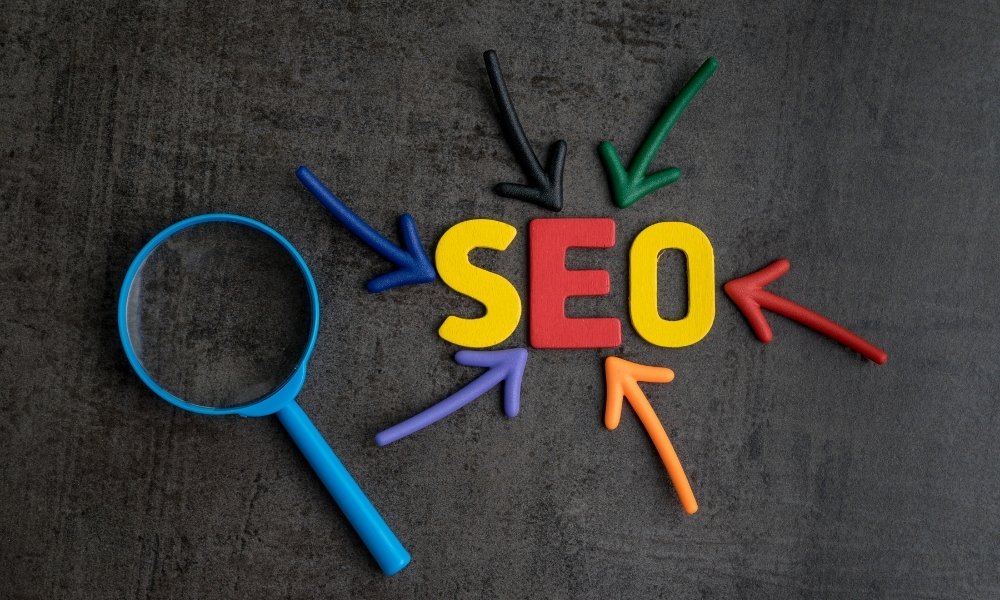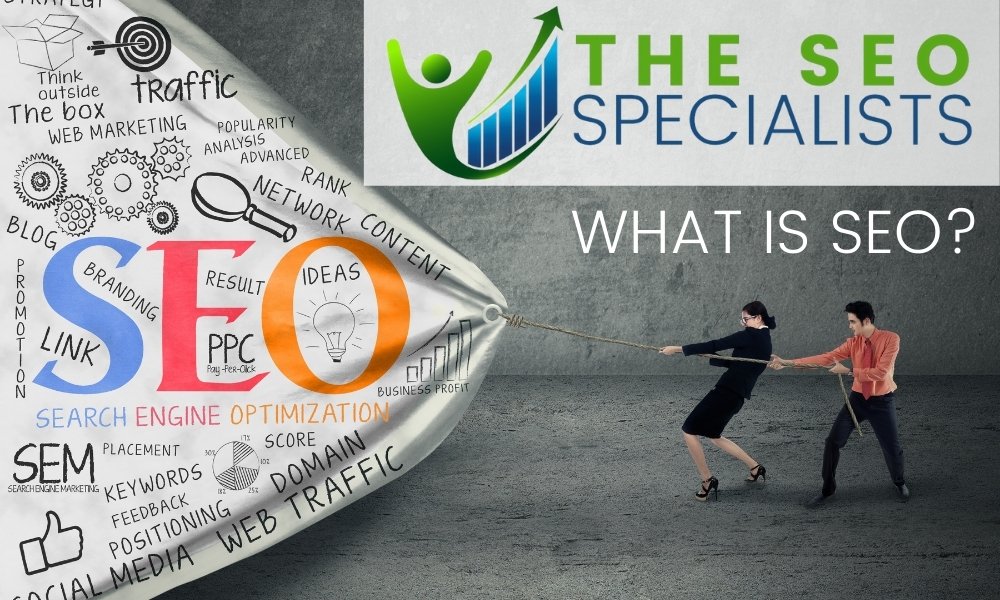Table of Contents
What is SEO?
SEO is an acronym for “search engine optimisation.” It’s the method of enhancing both the quality and volume of website traffic, as well as exposure to your business brand or online profile, through non-paid (also recognised as “organic”) search engine results.
Despite the acronym, SEO is as much regarding people as it is concerning search engines themselves. It’s about learning what people are exploring online, the solutions they are searching for, the words they’re utilising, and the type of content they wish to read or watch. Understanding the answers to these topics will enable you to connect to the people searching online for the services, products and information you offer.
Understanding your audience’s intention is one side of the SEO coin. Presenting it in a way search engine crawlers can discover and understand is the other. In this guide, expect to find out how to do both.
Search engine basics
Search engines are answer engines. They seek billions of pieces of content and assess thousands of determinants to decide which content is most likely to answer your question.
Search engines do all of this by finding and cataloguing all possible content on the Internet (web pages and sites, PDFs, images, videos, etc.) via a manner known as “crawling and indexing,” and then placing it by how well it suits the query in a process we attribute to as “ranking.”
Which search results are “organic”?
As we mentioned previously, organic search results are the ones that are won by effective SEO, not paid for (i.e. not advertising). These used to be simple to spot – the ads were prominently labelled as such, and the remaining results mostly took the form of “10 blue links” placed below them. But with the way search has evolved, how can we spot organic results now?
In today’s world, search engine results pages usually referred to as “SERPs”, are packed with both more advertising and more dynamic organic results formats (termed “SERP features”) than we’ve ever witnessed before. Some SERP features are featured snippets (or answer boxes), image carousels, People Also Ask boxes, etc. In addition, brand-new SERP features continue to appear, driven principally by what people are exploring.
For instance, if you search for “Denver weather,” you’ll see a weather forecast for the city of Denver immediately in the SERP rather than a link to a website that may have that forecast. Also, if you search for “pizza Denver,” you’ll notice a “local pack” result made up of Denver pizza places. Handy, right?
It’s essential to identify that search engines make money from advertising. Their aim is to better answer searchers’ queries (within SERPs), keep searchers coming back, and hold them on the SERPs longer.
Certain SERP features on Google are organic and may be affected by SEO. These cover featured snippets (a promoted organic result that presents an answer inside a box) and associated questions (a.k.a. “People Also Ask” boxes).
It’s worth heeding that there are many other search features that, even though they are not paid advertising, can’t typically be affected by SEO. These features often have data collected from proprietary data sources, such as Wikipedia, IMDb and WebMD.
Why SEO is important
Whilst paid advertising, social media, and different online platforms can produce traffic to websites, most online traffic is pushed by search engines.
Organic search results incorporate more digital real estate, look more credible to savvy searchers, and experience way more clicks than paid advertisements. For instance, under 5% of users click on Google Ads. The rest goes on organic search results, which are there due to search engine optimisation.
Of distinct search queries in Google, only 3.4% resulted in a click on an AdWords (paid) ad.
Source: Moz.com
Inside a nutshell: SEO has ~20X more traffic events than PPC on both mobile and desktop.
SEO is also one of the exclusive online marketing channels that, when set up accurately, can continue to pay dividends over some time. For example, suppose you produce a solid piece of content that merits ranking for the best keywords. In that case, your traffic can accumulate over time, whereas advertising requires continuous spending to convey traffic to your website.
Search engines are becoming more intelligent, but they still require our help.
Optimising your website will help give better information to search engines so that your content can be appropriately indexed and displayed in search results.
You can read more on our article about Why Is SEO Important?
Should I hire an SEO professional, agency or consultant?
Depending on your bandwidth, enthusiasm to learn, and the complexity of your blog or website(s), you can perform any basic SEO yourself. Or, you might find that you would fancy the help of an expert. Each way is okay!
Assume you end up searching for expert help. In that situation, it’s essential to know that numerous agencies and SEO consultants “provide SEO services” but can range extensively in quality. Understanding how to choose a good SEO company can free you a lot of time and money, as the faulty SEO techniques can really harm your site more than they will benefit.

White hat vs black hat SEO
“White hat SEO” applies to SEO procedures, best practices, and strategies that live by search engine rule. Its primary focus is to provide more value to people. White Hat SEO means implementing best practices but not manipulating the Google algorithm through unethical practices.
“Black hat SEO” refers to methods and approaches that try to spam/fool search engines. While black hat SEO can work, it places websites at enormous risk of being penalised and/or de-indexed (excluded from search results) and has moral implications.
Penalised websites have bankrupted companies. So it’s just another reason to be very cautious when engaging with an SEO expert or agency. At The SEO Specialists, we don’t use any unethical SEO tactics in any way, as we can be in as much trouble as the business going bankrupt because of it.
Search engines share goals with the SEO industry.
Search engines want to assist you to succeed. In reality, Google even has a Search Engine Optimisation Starter Guide, much like the Beginner’s Guide! They’re also immensely supportive of efforts by the SEO society and community. In addition, digital marketing conventions, such as Unbounce, SearchLove, MNsearch, and Moz’s MozCon, constantly attract engineers and delegates from major search engines.
Google helps webmasters and SEOs through their Webmaster Central Help Forum and by hosting live office hour hangouts. (Bing, regrettably, shut down their Webmaster Forums in 2014.)
While webmaster guidelines differ from search engine to search engine, the underlying policies stay the same: Don’t try to deceive search engines. Alternatively, present your visitors with a great online user experience. To do this, follow search engine guidelines and fulfil user intention.
Google Webmaster Guidelines
Basic principles:
- Make pages principally for viewers and users, not search engines.
- Don’t mislead your users.
- Avoid tricks designed to enhance search engine rankings. A great rule of thumb is whether you’d feel happy describing what you’ve done to a website to a Google employee. Another practical test is to ask, “Does this assist my users and readers? Would I do this if search engines didn’t exist on the internet?”
- Think about what makes your website different, relevant, valuable or engaging.
- Provide clear, deep, appealing, and easy-to-find content on your website.
- Keep page titles clear and appropriate.
- Links are viewed as a sign of popularity, and search engines reward links that have developed organically.
- Social impact and social shares are positive signals. They can have an influence on how you rank organically in the long term.
- Page speed is essential, along with a positive, valuable user experience.
- Use alt attributes to define images so that search engines can better know the content.
Things to avoid In SEO:
- Automatically created content
- Engaging in link schemes
- Producing pages with little or no unique content (i.e. copied from someplace else)
- Cloaking — the system of showing search engine crawlers different content than visitors and readers.
- Invisible or hidden text and links
- Doorway pages — pages designed to rank well for particular searches and keywords to funnel traffic to your website.
- Thin content, pages displaying primarily ads or affiliate links, or otherwise redirecting visitors to other websites will not rank favourably.
- Abusive link practices that strive to expand the number and characteristics of inbound links, such as buying links, engaging in link schemes, can head to de-indexing.
- Ensure clean, compact, keyword-inclusive URL structures are in position. Dynamic parameters can muddy up your
- URLs and produce duplicate content problems.
- Make your URLs descriptive, short, keyword-rich if practicable, and dodge non-letter characters.
- Embedding links in Javascript/Flash/Silverlight; retain content out of these as well.
- Duplicate content
- Keyword stuffing or unnaturally written content that is unreadable or doesn’t make sense
It’s a good idea to be very intimate with Google’s Webmaster Guidelines. Make some time to get to understand them.
See the complete Google Webmaster Guidelines here.

